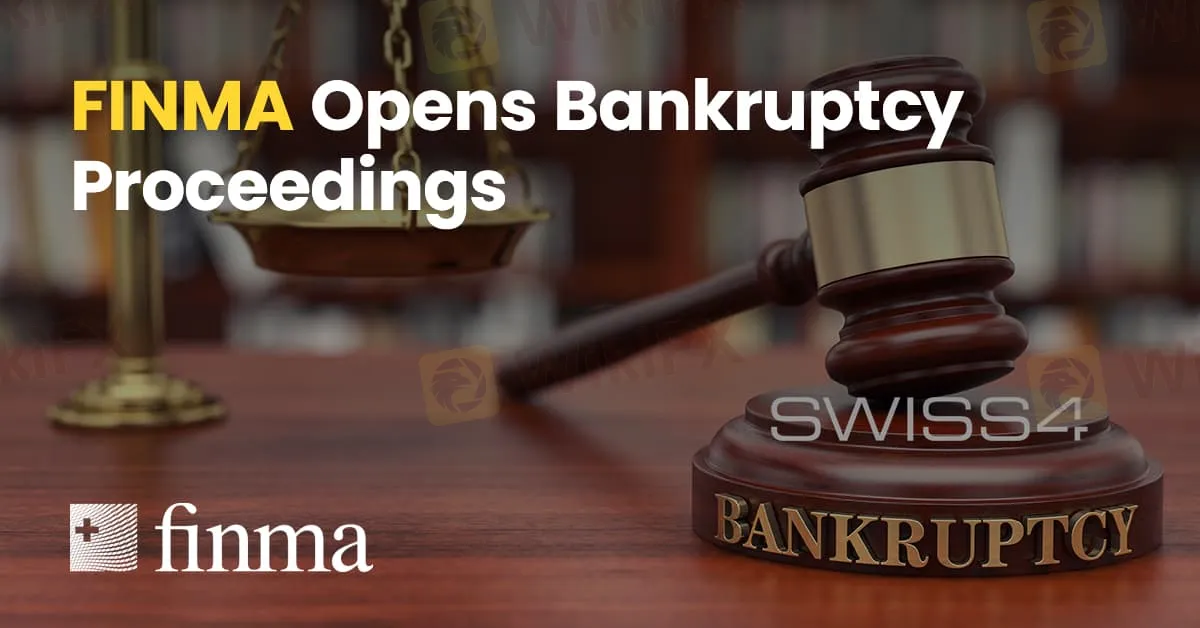简体中文
繁體中文
English
Pусский
日本語
ภาษาไทย
Tiếng Việt
Bahasa Indonesia
Español
हिन्दी
Filippiiniläinen
Français
Deutsch
Português
Türkçe
한국어
العربية
FINMA Opens Bankruptcy Proceedings
Abstract:On 4 March 2025, the Swiss Financial Market Supervisory Authority (FINMA) initiated bankruptcy proceedings against the FinTech start-up SWISS4.0 SA. The decision came after a thorough evaluation revealed that the institution was overindebted and facing serious liquidity challenges.

On 4 March 2025, the Swiss Financial Market Supervisory Authority (FINMA) initiated bankruptcy proceedings against the FinTech start-up SWISS4.0 SA. The decision came after a thorough evaluation revealed that the institution was overindebted and facing serious liquidity challenges.
A Pre-Emptive Regulatory Move
FINMA had been monitoring SWISS4.0 SA closely, urging the micro-start-up—and its corporate leadership—to take early corrective measures to stabilize its financial situation. Despite these efforts, the start-up, which currently serves around 250 customers, was unable to implement adequate remedial actions within a reasonable timeframe. The regulators decision underscores its commitment to maintaining financial stability and protecting the interests of consumers.
Appointment of a Bankruptcy Liquidator
FINMA engaged Valfor Avocats Sàrl as the bankruptcy liquidator in light of the deteriorating financial condition. This appointment is expected to facilitate an orderly resolution of the start-ups affairs, ensuring that any necessary steps are taken to mitigate the impact of the bankruptcy on clients and creditors.
Regulatory Framework and FinTech Licence Considerations
The case of SWISS4.0 SA brings to the forefront the unique regulatory environment surrounding FinTech institutions in Switzerland. The FinTech licence, governed under Article 1b of the Banking Act, was intentionally designed with lower supervisory requirements. This regulatory choice was made to foster innovation and allow new business models to emerge with reduced entry barriers.
However, the leniency in regulatory demands also comes with its own set of risks. In the event of a bankruptcy, client assets held by FinTech institutions are not automatically privileged nor covered by traditional deposit protection schemes. Consequently, institutions operating under this licence are legally mandated to inform their clients about these limitations.
Looking Ahead: Enhancing Client Protection
FINMAs actions in the SWISS4.0 SA case are part of a broader regulatory review. As part of an ongoing project to amend financial market legislation, the authority is committed to ensuring that, in future failures, client assets will receive appropriate protection. This initiative reflects the balancing act between encouraging innovative financial services and safeguarding the financial stability and security of consumers.
Implications for the FinTech Sector
The proceedings against SWISS4.0 SA serve as a cautionary tale for other FinTech start-ups. While the relaxed supervisory requirements have encouraged the growth of innovative business models, they also necessitate vigilant risk management practices. The industry now faces increased scrutiny, as regulators seek to ensure that the drive for innovation does not come at the cost of financial stability.
As the case unfolds, stakeholders across the Swiss FinTech landscape will be watching closely, with the expectation that future regulatory adjustments will better protect consumer interests while still allowing room for innovation.

Disclaimer:
The views in this article only represent the author's personal views, and do not constitute investment advice on this platform. This platform does not guarantee the accuracy, completeness and timeliness of the information in the article, and will not be liable for any loss caused by the use of or reliance on the information in the article.
Read more

Never Heard of Dynasty Trade? Here's Why You Should Be Worried
Have you heard this name before? No , it’s time you do because staying unaware could cost you. This platform is currently active in the forex trading and has been linked to several suspicious activities. Even if you’ve never dealt with it directly, there’s a chance it could reach out to you through ads, calls, messages, or social media. That’s why it’s important to know the red flags in advance.

WEEKLY SCAM BROKERS LIST IS OUT! Check it now
If you missed this week's fraud brokers list and are finding it difficult to track them one by one — don’t worry! We’ve brought together all the scam brokers you need to avoid, all in one place. Check this list now to stay alert and protect yourself from fraudulent brokers.

Catch the Latest Update on BotBro & Lavish Chaudhary
BotBro, an AI-based trading platform, became popular in India in 2024—but for negative reasons. Its founder, Lavish Chaudhary, who gained a huge following by promoting it heavily on social media. Since then, he has become well-known, but for many controversies. Let’s know the latest update about Botbro & Lavish Chaudhary.

Trading Other People’s Money | What Prop Firms Don’t Tell You
Proprietary (prop) trading firms have become increasingly popular. They give traders the chance to trade with larger amounts of money without risking their own savings. For many, this sounds like the perfect opportunity to grow faster and earn more. But while the benefits are appealing, there are also risks and hidden rules that traders must understand before joining a prop firm.
WikiFX Broker
Latest News
WEEKLY SCAM BROKERS LIST IS OUT! Check it now
Apex Trader Funding is an Unregulated Firm | You Must Know the Risks
What WikiFX Found When It Looked Into Aron Markets
Textiles to whisky: U.K.–India 'historic' deal is set to boost bilateral trade by over $34 billion a year
Thailand-Cambodia border clashes: Cambodia's economy has more to lose, analysts say
Puma shares plunge 18% after full-year sales, profit outlook cut on U.S. tariffs
Is Your Forex Strategy Failing? Here’s When to Change
FSMA Warns That Some Firms Operate as Pyramid Schemes
Federal Reserve likely to hold interest rates steady despite pressure from Trump. Here's what that means for your money
Sigma-One Capital Scam? Investors Say They Can’t Withdraw Funds
Currency Calculator


